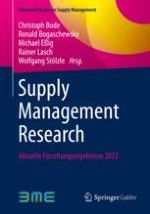2022 | Buch
Supply Management Research
Aktuelle Forschungsergebnisse 2022
herausgegeben von: Christoph Bode, Ronald Bogaschewsky, Michael Eßig, Rainer Lasch, Wolfgang Stölzle
Verlag: Springer Fachmedien Wiesbaden
Buchreihe : Advanced Studies in Supply Management
